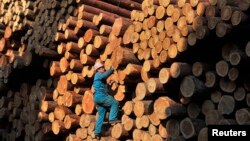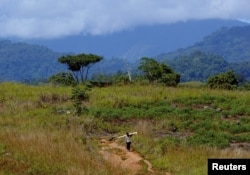The South Pacific nation of the Solomon Islands is felling its tropical forests at nearly 20 times a sustainable rate, according to research by an environmental group published Thursday, driven by insatiable Chinese demand for its lumber.
Export volumes of the archipelago’s single largest export commodity leapt more than 20 percent to just more than 3 million cubic meters in 2017, central bank figures show, worth $3 billion Solomon Islands dollars ($378 million).
Environmental and rights group Global Witness said this was more than 19 times higher than sustainable levels and if continued could denude the country and soon exhaust the single biggest contributor to the Solomons’ economic growth.
Deforestation also removes wild fruits and vegetables that are a local food source and destroys the habitats of animals.
Top importer of timber
Global Witness’ analysis of import data also found that the overwhelming majority of the lumber was sent to China, the world’s top importer of timber, which it said underscored the urgency for Beijing to regulate imports and probe their origins.
“The scale of the logging is so unsustainable that natural forests will be exhausted very soon if nothing changes,” Beibei Yin, who led the research team that compiled the report, told Reuters by phone from London where Global Witness is based.
“The Chinese companies which import most of the wood are so significant that if all of them together stop buying there is still a chance to revert back,” she said.
Out of trees by 2036
Global Witness took 155,000 cubic meters as a sustainable log export volume from the Solomons, which is the lowest but most recently calculated of several government and expert analyses, with the highest being approximately 300,000.
It gave no date of its own for the possible exhaustion of forests but cited a preliminary estimate of 2036, which was made in 2011 by the Solomons’ forestry ministry.
The Solomon Islands prime minister’s office directed Reuters to the secretary for the Forestry Minister, who did not immediately respond to an emailed request for comment.
China’s commerce ministry did not immediately respond to a faxed request for comment.
Toughening regulations
The Solomon Islands has more than 2.2 million hectares (5.4 million acres) of forest covering about 80 percent of its land area, which is spread over some 990 islands.
Though the country’s forestry ministry has previously said it had toughened regulations to combat illegal logging, Global Witness said a lack of enforcement capacity increased the risk of loggers cutting more than permitted.
Global Witness’ satellite analysis of logging roads showed 669 km (416 miles) lying above 400 m (1,300 feet) elevation, where logging is nominally restricted.
Interpol estimates the global trade in illegal lumber to be worth more than $50 billion annually.













